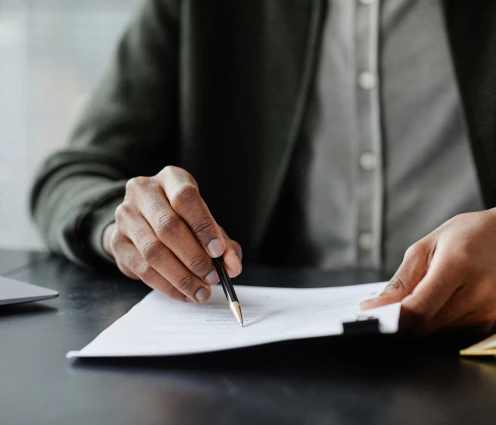

Finding the perfect employee for your company is no easy feat and takes a lot of consideration.
Interviews are a great way for you to get to know the candidate and evaluate whether they’re a good fit for the role. How you conduct your interview can impact your decision (and theirs), so it’s important you get it right!

Define Exactly What You’re Looking For
So, you want to know how to interview someone for a job. Well the first step is defining exactly what you’re looking for. Knowing what you want from a candidate is vital – how else will you know when you find it?
Think about the attributes and characteristics of previous employees in the role.
Were they successful or unsuccessful at their job? Were they confident and outgoing, or meticulous and introverted? Did they enjoy their job? Knowing people previously performed in the role can inform your decision moving forward.
Make sure all the interviewers are on the same page.
Ideally, all the interviewers will agree on the criteria for a successful candidate. This is important if different people from your team will be conducting the interviews throughout the hiring process.

Plan the Interview Structure
Here at Hyper Recruitment Solutions, we’ve tried out all kinds of creative interview techniques to put candidates to the test, and we’ve learnt that there’s no ‘right’ or ‘wrong’ way to conduct an interview.
However, it’s important that you structure your interview so that both you and the candidate have a clear understanding of what to expect. Here’s are a few pointers to help you structure your interview:
Initial Introduction
Candidate will no doubt be feeling nervous when they arrive for the interview, have a couple of minutes of small talk to put them at ease. Ask them how their journey was, talk about the weather but avoid anything that could come across discriminatory.
Asking Questions
Most of the interview will be spent asking questions. We’ll talk more about the types of questions you should ask a little later on, but bear in mind that an interview is a conversation not an interrogation. Try and ask questions that give the candidate chance to self-analyse and listen to their answers slowly.
Candidate’s questions
An interview is a two-way evaluation, while you’re deciding whether they’re a good fit for the company, they’re also deciding if they’d like to work for you. Make sure you provide plenty of time in the interview for the candidate to ask any questions they may have.
Explain the next steps
As the interview comes to a close, make sure you outline the next steps to the candidate. How long will they have to wait to hear a response? Will there be another round of interviews? Etc
What Questions Should You Ask During an Interview?
When it comes to interview questions, there are some definite do’s and don’ts. There are lots of different ways you can question your candidate, but one thing you should avoid is asking inappropriate questions. That means avoiding interview questions about – age, health, marital status and ethnicity.
Here are some examples of good questions to ask during an interview, that you could weave into your own strategy:
Tell me about yourself & why you think you’re a good fit for this role?
What would you say your biggest strengths are?
What makes you stand out from other candidates for this role?
What’s been your biggest achievement in your career so far?
When was the last time you had to deal with a problem? How did you deal with it?
What are your salary expectations?
Do you have any questions for me/us?

Of course, these questions are fairly generic. If you’re interviewing for a very specific role eg. in aerospace engineering, you’ll want to ask questions that focus on relevant qualifications, interest in the industry outside of work, and questions to test the candidate’s aptitude and intelligence.
You’re well within your rights to set candidates a test or challenge to see how they perform under pressure here's a prime example. In some cases, it’s better to give the candidate an outline of what to expect so they can prepare, but this really comes down to the role and the type of interview you decide to conduct.


Ricky Martin BSc (Hons) FIRP CertRP MRSCInterviews need to be seen as a two way process in today’s world. It is an opportunity for a future employee to make an assessment on your company just as much as a chance for you to see if they are suitable for your business.
If you don’t conduct an interview in a way that gets your business culture across, and realise that the way you act can have a positive, or worse still negative impact on the candidate, you will soon struggle to hire top talent in this candidate light market place.
So think about making the right first impression as the interviewer, not just an interview is all down to the candidate to impress you!
Managing Director, Hyper Recruitment Solutions


Ricky's Top 5 Tips For Hiring
If you follow my top five tips, I can assure you that you will maximise your opportunity of hiring the right candidate.


If you want Hyper Recruitment Solutions to support you in the hunt for the perfect candidate, don’t hesitate to get in touch!

